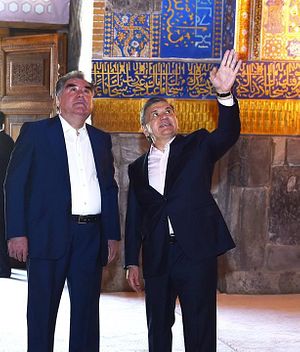Uzbekistan’s top priority in its foreign policy in the past two years has been to amend relations with its neighbors. A lot has been achieved, but nothing compares to the relief, appreciation, and excitement displayed by people on both sides of the Tajikistan-Uzbekistan border invoked by the new chapter of relations between the counties. Illustrating the saliency of security matters in the Tajikistan-Uzbekistan relationship, over the past several months there have been prominent interactions between the national security ministries of both countries, as well as their first ever joint military exercise.
Uzbek President Shavkat Mirziyoyev deployed strong metaphors to conjure up the closeness of Tajiks and Uzbeks, recently comparing the two nations to two branches of the same tree and two streams of the same river. Indeed, the rapprochement between the countries is nothing less than the two nations rediscovering their roots.
When the first official exchange between the countries took place in March 2018, Mirziyoyev’s statement in Dushanbe of “coming to Tajikistan with open borders and open heart” acutely contrasted with former Uzbek President Islam Karimov’s threat in 2012 to wage a war on the same borders. Since the visit a number of practical changes have taken place, the most prominent being abolishing visas for short-term visitors and re-opening border crossing points.
Tajik President Emomali Rahmon’s reciprocal visit to Uzbekistan, scheduled for August 17-18, 2018, was preceded by mutual visits by the intelligentsia of both countries and friendship delegations. Emotions and relief filled these meetings and brewed some soul searching. In a recent article in the national newspaper Xalq So’zi, Uzbek Senator Iqbol Mirzo likened Uzbekistan of the pre-Mirziyoyev period to a dark history of rejecting neighbors. While Uzbek officials have been speaking unfavorably of late regarding past policies, such as monetary policy, and the degraded education and health systems, Mirzo appears to be the first high-ranking official to give an overall scathing review of the previous regime.
The major outcome of Rahmon’s visit to Tashkent was locking the two counties into a strategic partnership, making Tajikistan Tashkent’s third strategic partner among the Central Asian states after Kazakhstan and Turkmenistan. The prominence of high-level national security meetings ahead of the Tashkent meeting seemed to lay the groundwork for the signing of the strategic partnership agreement. Between March and August of 2018, four major ministries with national security mandates held meetings with their counterparts in Tajikistan.
In August 2018, the Ministries of Emergency, Defense, and the State Secret Services of both counties held official meetings. Cooperation between the agencies was the major topic in the interactions, and additionally the defense ministries of Tajikistan and Uzbekistan discussed establishing beneficial terms for deploying military technology. In May 2018, the two Ministries of Interior discussed fighting terrorism, international crime, and information sharing. In August 2018, these meetings culminated in the first ever bilateral border exercises in the history of both countries, involving not only ground forces but aviation and patrol boats pushing back mock fighters from Afghanistan.
Restored relations between Tajikistan and Uzbekistan are beneficial for both countries. The advantages of friendship that have been taking root in the past several months are just early chapters of a blooming bilateral relationship. In the meantime, the heavy emphasis on national security in intergovernmental interactions indicates that at this stage of relations, Uzbekistan considers security as the most important contributing factor in its relations with Tajikistan.

































